

5 Learning Techniques Psychologists Say Kids Aren’t Getting. The lesson you never got taught in school: How to learn! A paper published in Psychological Science in the Public Interest evaluated ten techniques for improving learning, ranging from mnemonics to highlighting and came to some surprising conclusions.
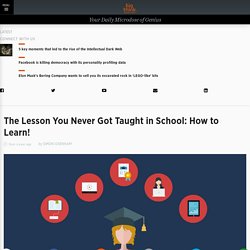
The report is quite a heavy document so I’ve summarised the techniques below based on the conclusions of the report regarding effectiveness of each technique. Be aware that everyone thinks they have their own style of learning (they don't, according to the latest research), and the evidence suggests that just because a technique works or does not work for other people does not necessarily mean it will or won’t work well for you. 10 Ways to Make Memory Rehab Work. Introduction to accelerated learning: 3. Review and recall. Learning cannot take place without memory, and we expect our students to be able to process, synthesise and recall a vast amount of information every day.
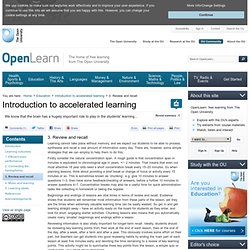
There are, however, some simple strategies that we can employ to help them to do this. Firstly consider the natural concentration span.
Extensive Guides. How To Remember Things. I once came up with a metaphor I thought perfectly captured the sheer mass of material my classmates and I were expected to memorize in our first two years of medical school: it was like being asked to enter a grocery store and memorize the names of every product in the store, their number and location, every ingredient in every product in the order in which they appear on the food label, and then to do the same thing in every grocery store in the city.
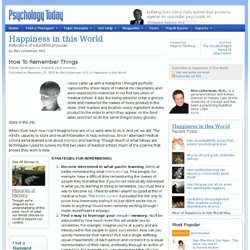
When I look back now I can't imagine how any of us were able to do it. And yet we did. The mind's capacity to store and recall information is truly wondrous. Mind - Research Upends Traditional Thinking on Study Habits. How to improve long-term memory. Memories are constantly in flux, decaying as soon as they have begun to form.

Although you can't count memories, if you could, you'd soon discover that more than half of what we experience is inaccessible to memory within a single hour. For this reason, when learning, it is best to continuously and cyclically review information as you go. Optimal revision During the 19th century, Hermann Ebbinghaus, a German psychologist, spent more than 15 years learning random strings of nonsense syllables, and testing himself on their recall. What he found has become one of the few certainties of neuroscience: namely, that all memories grow continuously weaker, but that the rate of "decay" lessens each time you review the information. Smarts: It's not how much you learn that matters. It's how much you remember. Forgetting follows a pattern.
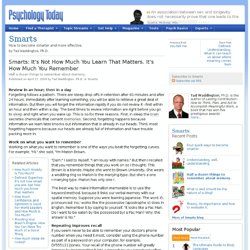
There are steep drop offs in retention after 60 minutes and after 24 hours. Boost Your Children’s Test Success With "Neuro-Logical" Strategies. With the help of correlations from neuroscience research, you can use best brain practices to help your children build the learning habits for best memory and test taking skills while also sustaining or restoring a positive attitude about school.

This first of a three-blog series will focus on several practices to make new learning stick and promote the neural circuits long-term memory so knowledge is truly understood and retained beyond the test. The Bleak Terrain of Memorization Rote memorization comprises approximately 70% of a student's study time. Each year, as more information is added to every subject, the volume of material that needs to be memorized increases. Test-taking should be an opportunity for children to demonstrate what they know and understand, but the No Child Left Behind system of evaluating the success of a school is by the cumulative test result averages of all students.
The Brain Seeks Patterns so Help Your Children Activate Prior Knowledge. Everything You Thought You Knew About Learning Is Wrong. Learning through osmosis didn't make the strategies list image courtesy of Flickr user indi.ca Taking notes during class?
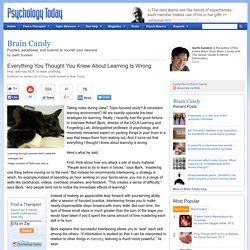
Topic-focused study? A consistent learning environment? All are exactly opposite the best strategies for learning. Really, I recently had the good fortune to interview Robert Bjork, director of the UCLA Learning and Forgetting Lab, distinguished professor of psychology, and massively renowned expert on packing things in your brain in a way that keeps them from leaking out. Here's what he said.
Mind - Research Upends Traditional Thinking on Study Habits. The New Way Doctors Learn. Turning a medical student into a doctor takes a whole lot of knowledge.

B. Price Kerfoot, an associate professor of surgery at Harvard Medical School, was frustrated at how much knowledge his students seemed to forget over the course of their education. He suspected this was because they engaged in what he calls “binge and purge” learning: They stuffed themselves full of facts and then spewed them out at test time. Research in cognitive science shows that this is a very poor way to retain information, as Kerfoot discovered when he went looking in the academic literature for answers.
But he also stumbled upon a method that really is effective, called spaced repetition. (MORE: Couch Potatoes Rejoice! The theory behind spaced repetition is simple: when we first learn a fact, our memory of it is volatile, subject to change or disappear. (MORE: The American Hopsital: The Most Dangerous Place?) How to study and take college tests. Robert Bjork: Remembering, Forgetting, and Desirable Difficulties. At this week’s Biology Leadership Conference (#BLC8), we were fortunate to hear a talk given by Dr.
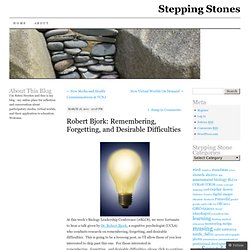
Robert Bjork, a cognitive psychologist (UCLA) who conducts research on remembering, forgetting, and desirable difficulties. Developing Good Study Habits Really Works. Knowledge is the essence of smart thinking. No matter how much raw intelligence you have, you are not going to succeed at solving complex problems without knowing a lot. That's why we spend the first 20 (or more) years of our lives in school. Study strategies of college students: are s... [Psychon Bull Rev. 2012.